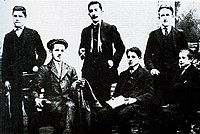| Млада Босна Mlada Bosna | |
 Some of the members | |
| Formation | 1911 |
|---|---|
| Dissolved | after 28 June 1914 |
| Type | Revolutionary organization |
| Purpose | Separation of Bosnia and Herzegovina from Austria-Hungary and unification with Serbia and Kingdom of Montenegro |
Key people | Gavrilo Princip |
| Affiliations | Narodna Odbrana and Black Hand |
Young Bosnia (Serbian: Млада Босна, Mlada Bosna) refers to a loosely organised grouping of separatist and revolutionary cells active in the early 20th century, that sought to end the Austro-Hungarian rule in Bosnia and Herzegovina.
Its members, primarily Bosnian Serbs but also Bosniaks and Bosnian Croats, were driven by various ideologies, prominently Yugoslavism, the unification of South Slavic peoples into a single Yugoslav state.[1] The group drew inspiration from a diverse range of philosophical influences, including German Romanticism, anarchism, and Russian revolutionary socialism. Young Bosnia's activities were influenced by historical events such as the Battle of Kosovo and figures like Fyodor Dostoevsky and Friedrich Nietzsche[citation needed].
The most infamous act associated with Young Bosnia was the assassination of Archduke Franz Ferdinand of Austria in Sarajevo on 28 June 1914 by Gavrilo Princip, one of its members.
- ^ Tomasevich 2002, p. 5.